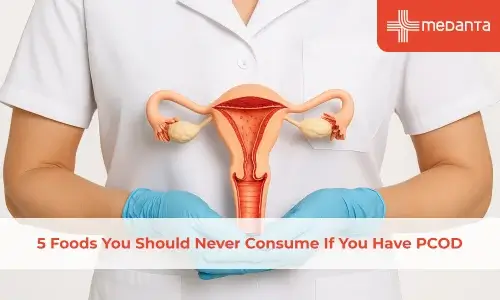5 Foods You Should Never Consume If You Have PCOD

TABLE OF CONTENTS
Introduction
Irregular menstruation or no periods are the typical symptoms of the polycystic ovarian
disorder (PCOD). Multiple ovarian cysts, frequently present in PCOD patients, are caused by
excessive production of androgen hormones.
Insulin levels in PCOD patients are reported to be higher than usual frequently. The
pancreas is where the hormone insulin is made, which assists the body's cells to convert
sugar into energy.
Your blood sugar levels may increase if your body doesn't create enough insulin. This can
also occur if you have insulin resistance, preventing you from adequately using your insulin.
A greater body mass index may also contribute to insulin resistance. People with PCOD
frequently struggle with this problem due to insulin resistance, which can make weight loss
more difficult. A diet rich in refined carbohydrates, such as starchy and sugary meals, might
make it more difficult to control insulin resistance and, consequently, weight loss.
Impact of PCOD on health
One of the primary reasons why infertility is on the rise is polycystic ovarian disorder or PCOD. It often emerges in late adolescence or the early 20s. PCOD impacts the ovaries’ functions. Although the precise origin of PCOD is yet unclear, genetics and hormone abnormalities are thought to have a role. In some cases, it can even run in families.
Every menstrual cycle, women generate an egg or ovum from their ovaries. This process is called ovulation. Women with PCOD experience irregular ovulation that causes irregular menstruation periods and makes getting pregnant difficult. As a result of PCOD, multiple cysts end up developing in the ovaries.
This leads to excessive androgen hormones. In females, an elevated testosterone level causes excessive hair growth and male-pattern baldness.

Foods to avoid in PCOD
When you have PCOD, it's crucial to eat frequently, maintain a stable blood sugar level throughout the day, and select balanced and nutritious meals. It is best to avoid low-carb, keto, intermittent fasting, and other popular diets, and eat modest, frequent meals throughout the day instead.
Here are 5 foods that experts recommend you avoid if you have PCOD:
Foods with excess sugar: It's important to keep sugar and PCOD as far apart as possible. This is because sugar impairs the control of insulin and induces inflammation. Half of fructose and half of glucose make up for sugar/sucrose.
Since fructose was hardly ever a part of the paleolithic diet, fructose consumption is not recommended for humans. Endotoxemia is caused by the average western diet's increased fructose intake, which weakens the intestinal barrier. Toxins from our stomach enter the circulation at this point which triggers an inflammatory reaction.
Foods with excess carbohydrates: Foods that include carbohydrates can be categorized as "simple" or "complicated." Sugars like sucrose, fructose, and glucose are examples of simple and easily accessible carbohydrates. Contrarily, the primary component of starchy meals is complex carbohydrates.
Foods rich in carbohydrates break down into glucose. The energy required for a healthy metabolism is then delivered by them when they enter circulation. The glycaemic index (GI) is the rate at which a meal raises blood sugar levels is indicated higher number. Our insulin levels will increase as the GI increases. Root vegetables are an example of a high-fiber, low-GI diet that humans are very well adapted to. However, consuming high-GI, glucose-rich meals daily might lead to insulin resistance and worsen PCOD.
Processed foods: The issue with processed meals is that they include a lot of sugar and carbohydrates, which work as preservatives to keep them useful for a long. Consuming processed foods regularly ends up interfering with your normal blood sugar management. Additionally, they frequently include dairy, gluten, vegetable oils, and food additives. These components cause inflammation in the body.
A classic example of processed food is fast food. However, processed food is an agricultural product undergoing mechanical, thermal, or chemical processing. It's crucial to realize that the elements matter more than the definition in this case.
Alcohol: Alcohol is one of the most harmful items to avoid from a nutritional standpoint if you have PCOD. Even occasional consumption of alcohol has been linked to higher risks of liver problems in PCOD-affected women. According to studies, this risk applies to all PCOD women irrespective of their weight.
Alcohol drinking in moderation may throw the estrogen-to-progesterone ratio off balance brutally. Additionally, it has been linked to decreased fertility and is dangerous to consume during pregnancy.
Alcohol consumption, no matter the quantity, badly interferes with your sleep patterns too. Additionally, it is known to weaken willpower and heighten appetites. That might be a big issue if you're trying hard to improve your eating or exercise routines. Alcohol consumption also impacts your metabolism severely.
Foods with vegetable oils: Industrial seed oils are commonly referred to as "vegetable oil." These refined oils are made from soy, maize, canola, cottonseed, and sunflower seeds. Any of these oils are used extensively in processed and fried items that are bad for your health. Women with PCOD should refrain from consuming such oils as they lead to inflammation in the body.
The imbalance of omega fats in industrial seed oils can lead to inflammation. While omega-3 fats lead to anti-inflammatory derivatives, omega-6 fats create pro-inflammatory metabolites. Omega 6:omega 3 ratios between 4:1 and 1:1 are regarded as optimum. However, a ratio of 20:1 or greater is the outcome of the typical Western diet. The main contributor to this imbalance is frequently the use of industrial seed oil. This is due to their high levels of omega-6 fats and low levels of omega-3 fats.






